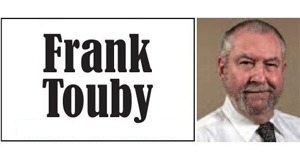 Frank Touby —
Frank Touby —
When it comes to determining what’s really going on in this city, I defer to my ever-knowledgeable source. He’s a man who is intimately in touch with the city’s elites and its movers and shakers.
That’s because as a shoemaker, Slovo encounters those who can afford shoes that are so finely crafted their owners have them repaired rather than tossing them into a used-clothes bin.
They have that proprietary sense of ownership that extends beyond their fine shoes and into the very city where they live and rule.
They carry the heavy secrets of our ruling class.
To their intimate servants—like their shoemaker—they sound out the details of their burdensome rule. Like a supporting character in Downton Abby, Slovo hears it it all. At your service, m’lord and m’lady.
There’s more grumble in Slovo’s servitude. But he’s necessary, so we tolerate it.
I make my pilgrimage to the shopping mall where Slovo holds court in his small space so filled with shelves and machinery it gives him just a sliver of space behind his long counter.
“Kak de-la?” I ask, using the Russian I learned in the U.S. Army before they sent me to the Pacific where I never heard another word in that language.
“Khoroshow,” Slovo replies. Then we’re back to English in which he’s nearly as comfortable as I.
He squints at me over a pair of brogues he’s working on.
He knows why I’m here. I bring no shoes. I’m not sure what I bring that keeps him opening up to me, but I don’t plan to rattle the circuits and lose this contact who is so in touch with our ruling class. And who shares tidbits with me.
I have a long list of questions I want to ask, but I have to be careful because he can be overly sensitive.
I’m interested in his opinion of the city’s situation with raccoons. The mayor has alleged they’re getting more numerous and much bolder and threatening.
“For him, maybe,” Slovo replies as he cuts a square of leather for a lady’s shoe.
“Why maybe?”
“Because he gets to interact with raccoons more than most people do.”
Slovo can be mysterious.
“How does he get to do that?” I ask.
“He does it with vodka.”
“With vodka?”
“He takes a big bottle of vodka into the woods in a park and meets the raccoons.”
“You mean when he’s trying to avoid the cops?” I ask.
“Of course he’s trying to avoid them. It’s not legal to drink vodka in the park but it’s more illegal to drink in your SUV. The raccoons find him interesting and easy to approach so they hang around and that’s what makes him think they’re taking over the city.”
“So we don’t really have a growing raccoon problem?”
“Not if you’re sober.”
So I guess now that Robbie’s on the wagon, his perception of our non-existent raccoon problem should change.
“But the mayor said they’re threatening children,” I continue.
“Have you heard that from anyone but him?”
On a different tack I ask about the new rapid rail from Union Station to Pearson airport.
“What’s to know?” he replies. “It’s a good thing. It means they can close that airport on the Island and move it to Pearson. Then we’ll have a bigger part of the Island for a park. And people can get there using that tunnel they built.”
Slovo does simplify things.
“But,” I ask, “what would the Toronto Port Authority have to do if that happens?”
He snorts, “Neecheevo!” Meaning, “Nothing!”
“You think,” he continues, “they need all those people to look after a few ships of sugar and road salt and sand and gravel? They’ve got nothing to do when the airport shuts down. The port authority is next to go.”
“I doubt it,” I reply. “Once they’ve got a money trap like that running, you won’t find many governments shutting it down. Although it is tiny compared to all other port authorities in Canada.
 We talk a bit about how shipping magnate Paul Martin, when he was prime minister, and another Liberal, Dennis Mills, stuck the city with that unnecessary midget Toronto Port Authority.
We talk a bit about how shipping magnate Paul Martin, when he was prime minister, and another Liberal, Dennis Mills, stuck the city with that unnecessary midget Toronto Port Authority.
“I always thought Liberals were more honourable than Tories,” I commented. Slovo grunted in disgust.
 TheBulletin.ca Journal of Downtown Toronto
TheBulletin.ca Journal of Downtown Toronto

